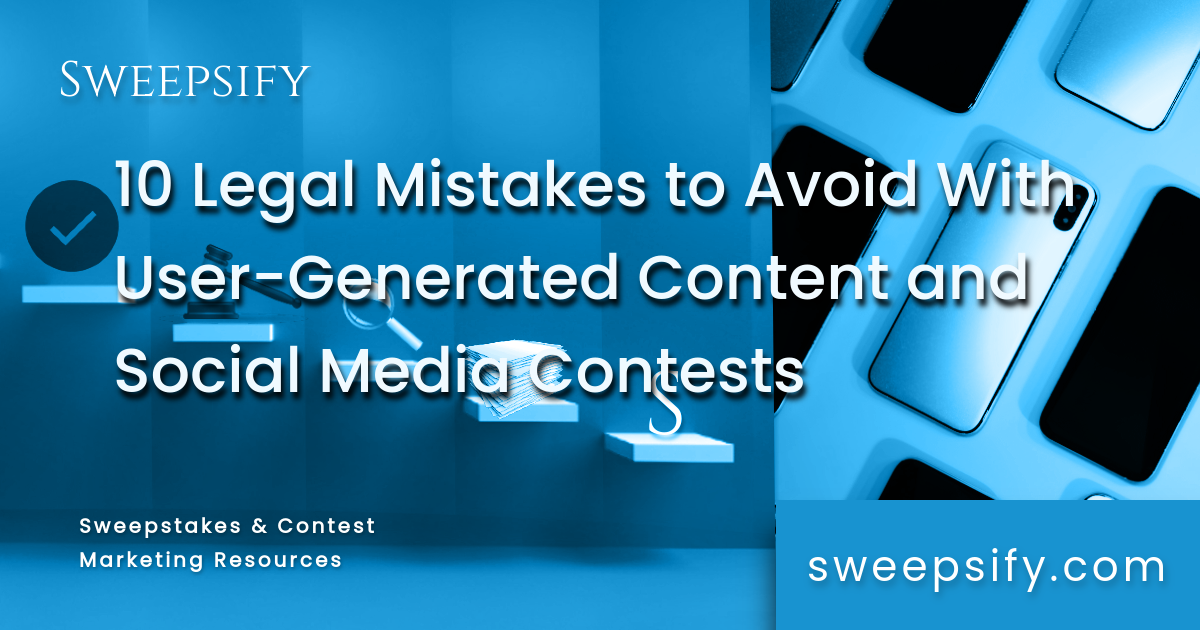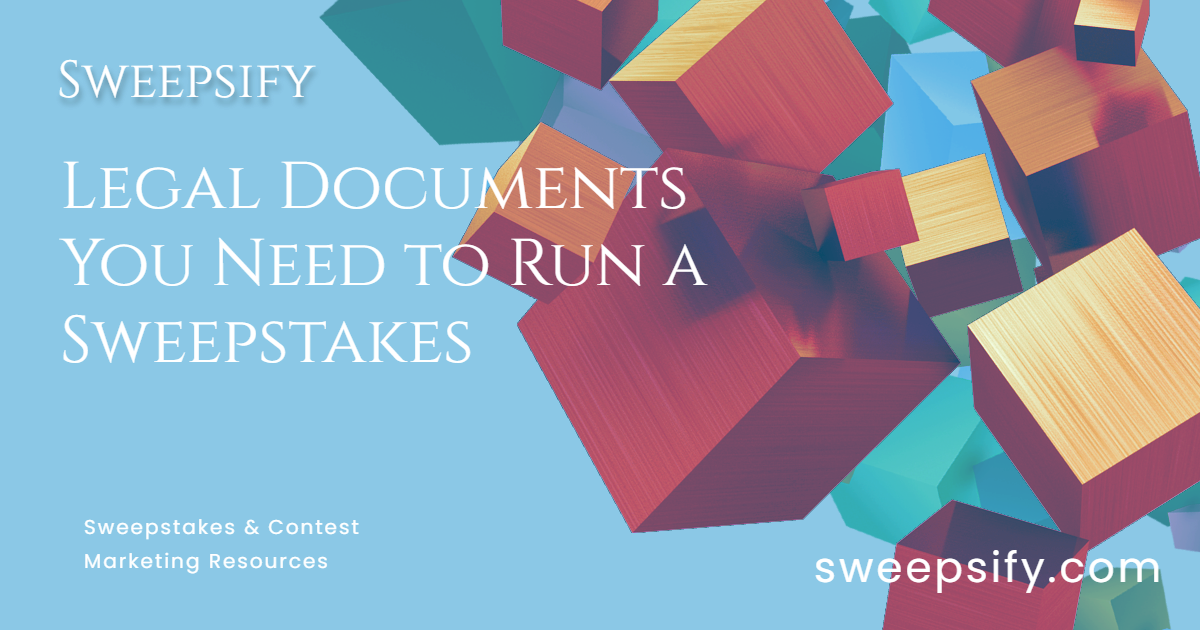Here is a list of our current affiliate partners and how we earn money
Avoid legal mistakes when running a sweepstakes with user-generated content. UGC from sweepstakes is an effective tool to promote your brand while demonstrating trust and authority. However, you don’t want to repost any UGC created by your sweepstakes participants without their permission, even by accident, as this can result in legal action.
If you ask participants to create UGC, you should always make sure to get their explicit permission to avoid legal risks. Read on to learn what types of UGC sweepstakes and contests generate, how to get permission to use UGC, and how to use UGC to boost your brand’s reputation.
Article Contents
IN THIS ARTICLE:
- Is it legal to use UGC from sweepstakes?
- What permission do you need for user-generated content?
- What are the legal aspects of UGC?

User-Generated Content Sweepstakes and Contests Legal Risks
User-generated content is content that social media contest and sweepstakes participants contribute in exchange for entries. UGC from sweepstakes may include photos, videos, images, comments, text, profiles, usernames, product names, likes, hearts, or other media. Ads are not considered as user-generated content unless they contain embedded social media content within them.
The best way to encourage the creation and sharing of user generated content is to encourage fans to create UGC and share it with their own followers.
via GIPHY
Who Owns the UGC From Sweepstakes and What Are the Legal Risks?
Participants create user-generated content as contest entries but do you own exclusive rights to their work that will allow you to do just about anything with it? Without obtaining explicit permissions via the proper paperwork, you don’t.
Your sweepstakes official rules need to explain how you will store their UGC content, how it will appear in your marketing, how the participant will be credited.
Simply relying on the branded hashtags and tags in social media posts to imply permission for reuse is not enough. If you don’t have explicit permission from your participants to use UGC, they may be able to sue you for damages.
How to Increase UGC Creation During Your Sweepstakes
If you want to increase UGC content created as a part of a contest or giveaway, you should do the following:
- Invite participants to use the designated hashtags for your sweepstakes.
- Encourage users to share their social media content entry submissions with their own followers.
- Offer multiple entries in exchange for participants submitting more UGC.

via GIPHY
1. Copyright Infringement from UGC Is a Common Legal Mistake
Participants retain copyright to their content by default. If you want to repost or republish UGC, you need to make sure that you are committing copyright violation.
You need to avoid copyright infringement in order to use UGC. Providing a disclaimer as well as clear and comprehensive Terms and Conditions for your sweepstakes UGC in your Official Rules. You should include a clause that makes it clear that when a participant submit this content, the sweepstakes Sponsor is permitted to use it as they like.

2. Not Using Abbreviated Rules on All Sweepstakes Advertising
Make participants aware of where they can find your Official Rules. This will help to ensure that they review any sections that explain how your brand will use UGC before they enter your contest. The Official Rules should explain exactly what types of submissions from users, including creative ideas, contest entries, and suggestions are considered as UGC.
Subscribe Now:
3. Not Getting Explicit Permission From Participants to Use UGC
If you encounter legal issues resulting from your UGC campaign, simply having told users about your Official Rules isn’t enough. Even once participants have agreed to your Terms and Conditions and have submitted their UGC to your sweepstakes or contest, you should still contact them again to get their permission before your brand publishes it.
via GIPHY
All sweepstakes rules that involve UGC should have a Privacy Policy. Cover user-generated content from your sweepstakes in your Privacy Policy by explaining all of the ways that your brand will collect, store, use, and share participants’ personal information. This includes any personally identifiable information (PII) that you collected via social media networks.
Some examples of PII that a social media contest participant may submit include their name, handle/alias on social media, home address, mobile phone number, home phone number, email address, age, and proof of identification.
Free Advertisement Maker with Templates
Canva lets you create eye-catching advertisements with their free ad maker. Customize your sweepstakes, contest, or raffle ads with trending images, fonts, and high quality design assets.
ADVERTISEMENT
via GIPHY
5. Not Ensuring That Your Sweepstakes Is Complaint With Privacy Laws
Not only does your sweepstakes or contest need to state how it handles participants’ privacy when it comes to collecting their personal information for UGC, it must comply with all applicable Privacy laws. Laws such as the California Consumer Privacy Act (CCPA), Canada’s Personal Information and Electronic Documents Act (PIPEDA), and EU General Data Protection Regulation (GDPR) are some of the regulations that all marketers must comply with for legal sweepstakes and contests.
Without considering these privacy issues, your brand may violate privacy law if you reproduce UGC that contains participants’ personal information or the participants personal information directly.
via GIPHY
6. Not Assessing the Legal Risks of Defamation and UGC
It is possible in certain circumstances for the sweepstakes Sponsor to be held liable for defamatory UGC created by participants. While it is a complicated area that requires the professional opinion of a lawyer, in most cases the social media platform is responsible for the activity. However, take care where and what type of UGC you post from your sweepstakes or contest.
7. Not Reviewing Social Media Content UGC for Inaccurate Statements
Often participants are unaware of what’s allowed and what’s not when it comes to making claims about brands. If a participants makes inaccurate declarations in UGC either about your company or another brand it could open your brand up to a lawsuit if you republish. Even if your brand did not create the content itself, your solicitation of UGC from participants could put you at legal risk.
via GIPHY
8. Not Examining the Legal Risks of Third-party Vendors and Data Collection
In order to run your sweepstakes, you will likely rely on multiple third-party vendors. These vendors may have to handle the personal identifying information of your sweepstakes participants. Brands need to navigate this legal maze with the help of an attorney to ensure that all data collection practices are legal and sufficiently disclosed via the Privacy Policy and sweepstakes rules.
via GIPHY
9. Not Addressing All of the Types of UGC in Your Sweepstakes Rules
You never know what your participants may submit as UGC to your social media contest or sweepstakes. As a result, a UGC policy that covers all of the types of user-generated content will help to ensure that your sweepstakes rules are comprehensive.
10. Not Managing Offensive or Inappropriate UGC from Your Participants
Not only are you required by law to protect your users from harmful content, many social media platforms ban unlawful, harmful, offensive, and inappropriate content from being uploaded to their platforms. Make sure that you review your sweepstakes rules to ensure that it defines how inappropriate or offensive UGC content is handled and how how submission of offensive or inappropriate UGC impacts participants’ eligibility to continue in the promotion.

Next Steps: The Right Permissions to Use UGC Help Avoid Legal Risks
Leveraging UGC from sweepstakes and contests for commercial purposes comes with a number of significant legal risks for brands. Giveaways that allow participants to upload information about themselves or other people, and share this content can result in third-party right infringement.
Despite the risks, there are many advantages to using sweepstakes and contests to obtain UGC. Including the right clauses in your sweepstakes rules and obtaining permission from your participants will help you to stay legally protected. If you have more questions about draft your UGC policy for your Official Rules seek out a sweepstakes lawyer or sweepstakes company to assist you further.
Looking for a sweepstakes company to help you with your next promotion? Sweepsify helps you find top sweepstakes companies in seconds. Create your free Premium account now to get started.



